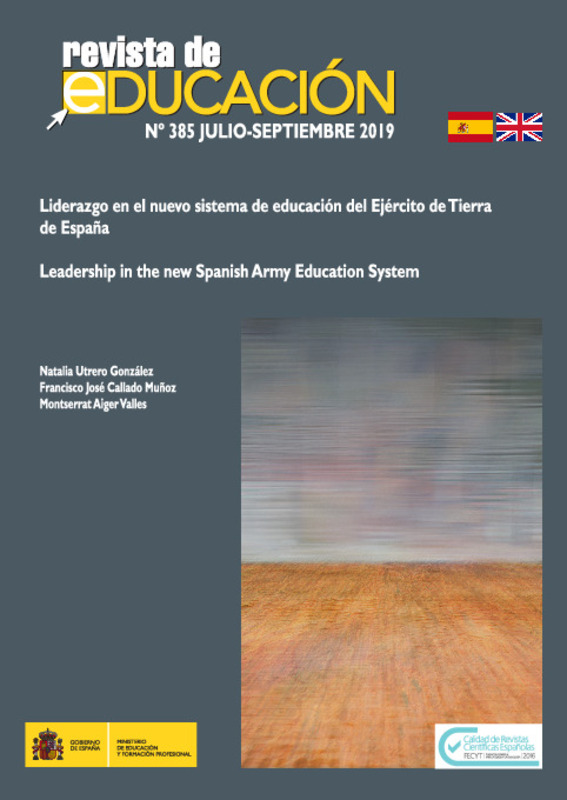|
Resumen:
|
[EN] The Spanish army has recently implemented a new integrated educational curriculum to train officers by bringing together excellent and up-to-date technical knowledge, with a special emphasis on leadership, careful ...[+]
[EN] The Spanish army has recently implemented a new integrated educational curriculum to train officers by bringing together excellent and up-to-date technical knowledge, with a special emphasis on leadership, careful physical preparation and a solid moral foundation. The new curriculum is part of a carefully renovated human resources policy to develop a new type of leadership capable of adapting and performing successfully in the flexible and uncertain environments where national armies operate. The objective of the paper is to carry out an analysis of the implementation of the new educational system following the framework of Wright and Nishii (2006) that allows evaluating the implementation of new initiatives aimed at changing human resources policy. The main axes of the new system are critically analyzed and, based on this analysis; its implementation is evaluated by means of a survey carried out on its users. The survey is made to the first promotion that has been formed in the new curriculum once completed their training at the University Center of Defense and before going to the special academies. Information is required regarding three fundamental areas: training at the center, internal practices and external practices. The results of the survey allow affirming that the design, communication and implementation of the curriculum is positively evaluated by the cadets. However, non-curricular training actions, such as external and internal practices and the development of leadership activities in real situations, which are considered complementary to formal education, receive a low evaluation, considering them not related to leadership. This evidence suggests aspects to be reviewed in the new education system with the aim of improving its effectiveness.
[-]
[ES] El ejército de tierra español ha implementado recientemente un nuevo currículum educativo integrado para formar a los oficiales aunando un conocimiento técnico excelente y actualizado, con un especial énfasis en el ...[+]
[ES] El ejército de tierra español ha implementado recientemente un nuevo currículum educativo integrado para formar a los oficiales aunando un conocimiento técnico excelente y actualizado, con un especial énfasis en el liderazgo, la preparación física cuidadosa y una sólida base moral. El nuevo plan de estudios es parte de una política de recursos humanos cuidadosamente renovada para desarrollar un nuevo tipo de liderazgo capaz de adaptarse y realizar un buen desempeño con éxito en los entornos flexibles e inciertos donde suelen operan los ejércitos nacionales. El objetivo del trabajo es realizar un análisis de la implementación del nuevo sistema educativo siguiendo el marco de Wright y Nishii (2006) que permite evaluar la puesta en marcha de nuevas iniciativas dirigidas a cambiar la política de recursos humanos. Se analizan de manera crítica los principales ejes del nuevo sistema y en base a este análisis se evalúa su implantación mediante una encuesta realizada a los usuarios del mismo. La encuesta se realiza a la primera promoción que se ha formado en el nuevo plan de estudios un vez finalizada su formación dentro del Centro Universitario de la Defensa antes de su marcha a las academias especiales. Se requiere información referente a tres ejes fundamentales: formación en el centro, prácticas internas y prácticas externas. Los resultados de la encuesta permiten afirmar que el diseño, la comunicación y la implementación del currículo es evaluado positivamente por los cadetes. Sin embargo, las acciones de capacitación no curricular, como son las prácticas externas e internas y el desarrollo de actividades de liderazgo en situaciones reales, que se consideran complementarias a la educación formal, reciben una evaluación baja, considerándolas no relacionadas con el liderazgo. Esta evidencia sugiere aspectos a ser revisados en el nuevo sistema educativo con el objetivo de mejorar su efectividad.
[-]
|
|
Código del Proyecto:
|
info:eu-repo/grantAgreement/AEI/Plan Estatal de Investigación Científica y Técnica y de Innovación 2013-2016/ECO2017-86305-C4-2-R/ES/CAMBIOS ORGANIZATIVOS PARA MEJORAR EL BIENESTAR SOCIAL/
...[+]
info:eu-repo/grantAgreement/AEI/Plan Estatal de Investigación Científica y Técnica y de Innovación 2013-2016/ECO2017-86305-C4-2-R/ES/CAMBIOS ORGANIZATIVOS PARA MEJORAR EL BIENESTAR SOCIAL/
info:eu-repo/grantAgreement/Gobierno de Aragón//S24_17R/
info:eu-repo/grantAgreement/Gobierno de Aragón//S52_17R COMPETE/
info:eu-repo/grantAgreement/UNIZAR//UZCUD2018-SOC-04/
info:eu-repo/grantAgreement/UNIZAR//UZCUD2018-SOC-O1/
info:eu-repo/grantAgreement/AEI//ECO2016-76255-P//BIENESTAR, MECANISMOS DE ASIGNACION Y POLITICAS PUBLICAS/
[-]
|
|
Agradecimientos:
|
Funded by the Spanish Ministry of Education and Science, ECO2016-76255-P y ECO2017-86305-C4-2-R; Reference research group COMPETE (S52_17R) and Grupo Psicologia: procesos cognitivos y social (S24_17R) Gobierno de Aragon - ...[+]
Funded by the Spanish Ministry of Education and Science, ECO2016-76255-P y ECO2017-86305-C4-2-R; Reference research group COMPETE (S52_17R) and Grupo Psicologia: procesos cognitivos y social (S24_17R) Gobierno de Aragon - Espana-and FEDER 2014-2020 "Construyendo Europa desde Aragon"; Universidad de Zaragoza, UZCUD2018-SOC-04 y UZCUD2018-SOC-O1; Centro Universitario de la Defensa, 2017-21 y 2018-12.
[-]
|









